Reporters Without Borders, a non governmental organisation advocating freedom of the press, has published its annual list of Predators of Press. The list names violent men in positions of power across the world, who have a bone to pick with the media.
The list includes "politicians, government officials, religious leaders, militias and criminal organisations that cannot stand the press, treat it as an enemy and directly attack journalists," says the organisation.
Rediff.com takes a look at some of these men who try to control the power of the pen by drawing blood with their swords.
...
Mullah Omar
Image: A file photograph shows Taliban members celebrating the seizure of KabulPhotographs: Reuters
Mullah Omar, the Taliban commander-in-chief who ruled Afghanistan between 1996 and 2001, likes to be addressed as the Amir al-Muminin.
He also likes terrorising the press, targeting journalists and threatening media publications. Mullah Omar went into hiding after the United States invaded Afghanistan in 2001. He is believed to be hiding in the Pahstun tribal areas near Pakistan border, from where he continues his regime of terror.
"His spokesmen try to be quoted in the media as much as possible and his thugs threaten local reporters who do not relay his propaganda. The Taliban controlling many areas of Afghanistan often kidnap journalists for ransom. The threats to journalists reinforce the Taliban's sway over the population and create news black holes in the south and east of Afghanistan and in western Pakistan," says Reporters Without Borders.
Kim Jong-Il
Image: North Korean leader Kim Jong-il smiles during a visit to a swimming poolPhotographs: Reuters
One of the world's worst tyrants, North Korean dictator Kim Jong-Il has not let his failing health hamper his maniacal ways of running the government. In his attempts to make North Korea the most isolated nation on earth, Kim Jong Il has banned cell phones. The fearsome regime has even executed people for the 'illegal' use of mobile phones.
The government has forbidden the entry of any foreign magazines, videos, films or CDs. Foreign journalists are not allowed to enter the country and any foreigner found within the North Korean territory is immediately declared a spy.
Kim Jong Il doesn't allow any independent publication to operate in the country. Newspapers and TV channels are forced to devote maximum footage to the 'great personality' of Kim Jong Il.
"Each day his activities begin the TV news broadcasts and are front-page stories in the newspapers. The misspelling of his name suffices to send the culprit to one of the ideological re-education camps," says Reporters Without Borders.
Mahmoud Ahmadinejad
Image: Iran's President Mahmoud Ahmadinejad cries during a religious ceremonyPhotographs: Raheb Homavandi/Reuters
He is the man who loves to tick off the United States and persecute the local media.
Iran President Mahmoud Ahmadinejad, though a democratically elected head of state, has imposed dictatorial curbs on the press. He took the steps after a furore was caused by the footage of the Iranian police ruthlessly crushing protests against the president in 2009. Many of the protestors, who claimed that the presidential election was rigged, were thrown behind bars.
Nearly 100 journalists also ended up in jail after they dared to question the validity of the elections and the president's repressive regime. The list of the journalists to be arrested was personally drawn up by the president, alleged Reporters without Borders.
"For the first time since the 1979 revolution, the government introduced a system by which print media content is systematically verified by the security services before publication. The government still refuses to put an end to the state monopoly on broadcast media and still prohibits private ownership of satellite dishes. Foreign media are closely watched and their local correspondents can have their accreditation withdrawn at any time, " says the organisation
Vladimir Putin
Image: Vladimir PutinPhotographs: Sergei Karpukhin/Reuters
Russia has recorded a startling number of cases where journalists and human rights activists have been murdered and the killers have gone free. Five journalists have been murdered in 2009 and 22 since 2000, when Vladimir Putin took over as the president.
Putin, an ex-KGB official, is not too fond of the press and journalists have been living under a shadow of fear under his regime.
Putin has often been criticised for his attempts to crack down on the Russian media, which is struggling to find its independent voice after years of Communist roadblocks. He reportedly supports a group of guards which intimidates journalists critical of the government or the Soviet regime.
A senior journalist alleged that Putin was spearheading 'judicial terrorism', as his administration had filed criminal cases or sued over 300 journalists.
"Control is the key word for Putin: control of the state, control of the economic and political forces, control of geopolitical strategic interests and control of the media. The national TV stations now speak with a single voice," says Reporters Without Borders
General Than Shwe
Image: Myanmar's dictator General Than Shwe at a Buddhist TemplePhotographs: Andrew Caballero-Reynolds/Reuters
The Burmese dictator has shut down independent media completely to keep under wraps the pathetic state of affairs in his country. His government undertakes routine crackdowns on the few journalists who have survived the ruthless regime.
In spite of these efforts, a video showing the gaudy and luxurious wedding of his daughter was leaked on the internet. The wedding, replete with diamonds and champagne, seemed incongruous in a nation battling desperate poverty.
Though General Than Shwe has promised to hold elections in the end of 2010 to elect a civilian government, few trust the dictator to keep his promise.
"He has had compliant judges impose long jail sentences on dozens of journalists, bloggers and human rights activists. The comedian and blogger Zarganar was sentenced to 59 years in prison for mocking the general. Hla Hla Win, a young video reporter, was sentenced to 20 years in prison for doing a report in a monastery," says the organisation.
Gotabhaya Rajapakse
Image: Sri Lankan President Mahinda Rajapakse hugs his brother GothabayaPhotographs: Sudath Silva/ Reuters
Sri Lakan Defence Secretary Gotabhaya Rajapakse had openly declared that he will not "allow journalists to demoralise the war effort" against the Liberation Tigers of Tamil Eelam.
But even after the decades-long civil war got over, Rajapakse has continued his offensive against journalists, who have been targeted in a series of attacks in the island nation.
The former soldier, along with his brother and Lankan President Mahinda Rajapakse, has cracked down on journalists and media publications that criticised the government in the run-up to the elections. Rajapakse was also openly hostile to popular editor Lasantha Wickrematunge, who was shot dead by unknown assailants.
"Dozens of state media employees were fired, suspended or threatened for protesting against the government's control of their editorial policies during the election campaigns. The two main state TV stations dedicated 96.7 per cent of air time during their news and current affairs programmes to reports supporting the president," said the organisation.
Hu Jintao
Image: Chinese President Hu JintaoPhotographs: Reuters
Press freedom is a concept unheard of in Communist China. The state-owned publications and dailies toe the government's line faithfully and eulogise the various policies and programmes undertaken by President Hu Jintao.
Jintao has reinstated many of the media restrictions withdrawn by his predecessors. He has put in place a press certification system which is going to give Chinese journalists training in Marxist news theories. The government has also blocked access to selected sites operated by major foreign news outlets, health organisations, foreign governments and educational institutions.
"Hu Jintao's determination to control the media cost the lives of infants who fell ill after consuming baby formula that was contaminated with melamine because, ahead of the Olympics, the authorities had forbidden the media to cover such stories," says Reporters Without Borders.

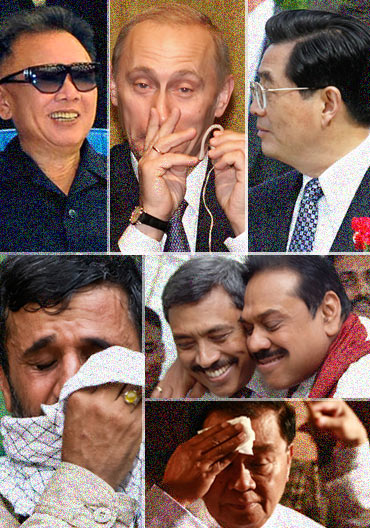


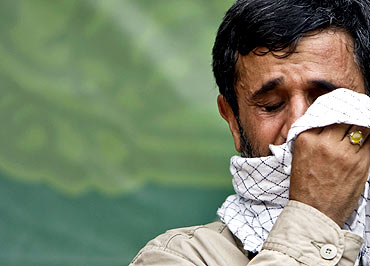
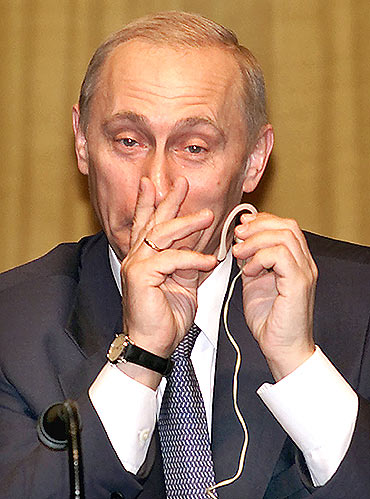
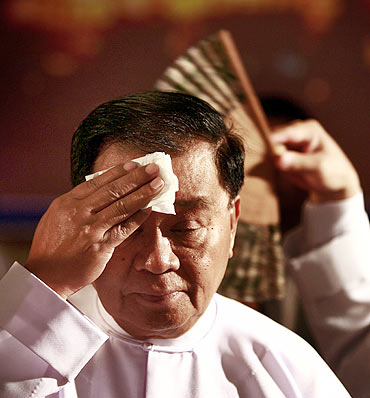
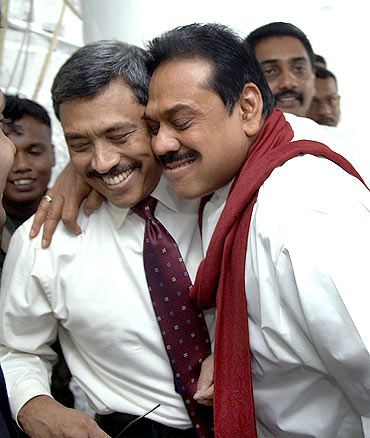
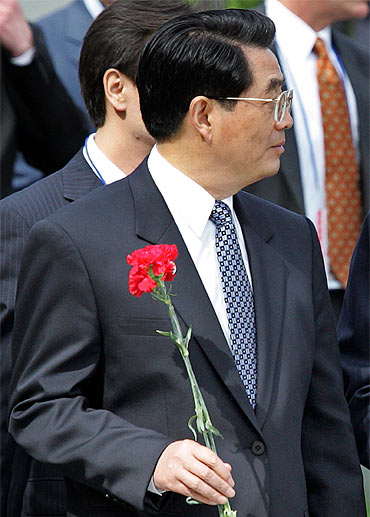
article